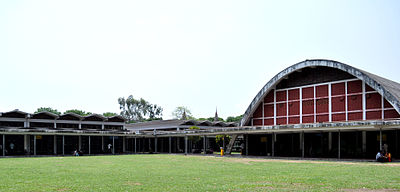- Konstantinos Apostolos Doxiadis
-
Constantinos Apostolou Doxiadis (Greek: Κωνσταντίνος Δοξιάδης; often quoted as C.A. Doxiadis) (1913 - 28 June 1975), was a Greek architect and town planner. He became world wide known as the lead architect of Islamabad, the new capital of Pakistan, and later as the father of Ekistics. Described as a scientist, salesman, visionary and man of action, he was an apt public speaker[citation needed].
Contents
Biography
Doxiadis graduated in architectural engineering from the Technical University of Athens in 1935, obtaining a doctorate from Charlottenburg University (today Technical University of Berlin) a year later. In 1937 he was appointed Chief Town Planning Officer for the Greater Athens Area. During World War II he held the post of Head of the Department of Regional and Town Planning in the Ministry of Public Works.[1] He took part in the Greek resistance and was decorated by the Greek and British governments. He distinguished himself as Minister of Reconstruction at the end of the war and it was this experience that allowed him in the 1950s to gain large housing contracts in dozens of countries.
In 1951 he founded Doxiadis Associates, a private firm of consulting engineers, which grew rapidly until it had offices on five continents and projects in 40 countries. In 1963 the company changed its name to DA International Co. Ltd. Consultants on Development and Ekistics.[1]
One of his most well known town planning works is Islamabad. Designed as a new city it was fully realised, unlike many of his other proposals in already existing cities, where shifting political and economic forces did not allow full implementation of his plans. The plan for Islamabad, separates cars and people, allows easy and affordable access to public transport and utilities and permits low cost gradual expansion and growth without losing the human scale of his "communities".
Theories
Doxiadis proposed ekistics as a science of human settlement and outlined its scope, aims, intellectual framework and relevance. A major incentive for the development of the science is the emergence of increasingly large and complex settlements, tending to regional conurbations and even to a worldwide city (Doxiadis uses the word "ecumenopolis"). However, ekistics aims to encompass all scales of human habitation and seeks to learn from the archaeological and historical record by looking not only at great cities, but, as much as possible, at the total settlement pattern.
Influence
In the 1960s and 1970s, urban planner and architect Konstantinos Apostolos Doxiadis (Constantinos Doxiadis) authored books, studies, and reports including those regarding the growth potential of the Great Lakes Megalopolis.[2] At the peak of his popularity, in the 1960s, he addressed the US Congress on the future of American cities, his portrait illustrated the front cover of Time Magazine, his company Doxiadis Associates was implementing large projects in housing, urban and regional development in more than 40 countries, his Computer Centre (UNIVAC-DACC) was at the cutting edge of the computer technology of his time and at his annual "Delos Symposium" the World Society of Ekistics attracted the worlds foremost thinkers and experts.
In Greece, he faced persistent suspicion and opposition and his recommendations were largely ignored. Having won two large contracts (National Regional Plan for Greece and Master Plan for Athens) from the Greek Junta he was criticised by competitors, after its fall in 1974, portrayed as a friend of the colonel's. His visions for Athens airport to be constructed on the adjacent island of Makronissos, where political prisoners were held, together with a bridge, a rail link and a port at Lavrion were never realised.[citation needed]
His influence had already diminished at his death in 1975, unable to speak for the last two years of his life, a victim of multiple sclerosis. His company Doxiadis Associates changed owners several times after his death, the heir to his computer company remained but without any links to planning or Ekistics. The Delos Symposium was discontinued, and the World Society of Ekistics is today an obscure organisation.[citation needed]
Works
- Teacher-Student Centre (TSC), University of Dhaka, Bangladesh; 1961
Publications
- Ekistics: An Introduction to the Science of Human Settlements. New York: Oxford University Press, 1968.
- Anthropopolis: City for Human Development.New York: W.W. Norton, 1974.
- Ecumenopolis: The Inevitable City of the Future. With J.G. Papaioannou. Athens: Athens Center of Ekistics, 1974.
- Building Entopia. Athens: Athens Publishing Center, 1975.
- Action for Human Settlements. New York: W.W. Norton, 1976.
See also
References
- ^ a b Biography at Doxiadis Foundation, retrieved 2009-10-09
- ^ Cities: Capital for the New Megalopolis.Time magazine, November 4, 1966. Retrieved on July 16, 2010.
External links
Categories:- Greek architects
- Greek urban planners
- 1913 births
- 1975 deaths
- Urban theorists
Wikimedia Foundation. 2010.

